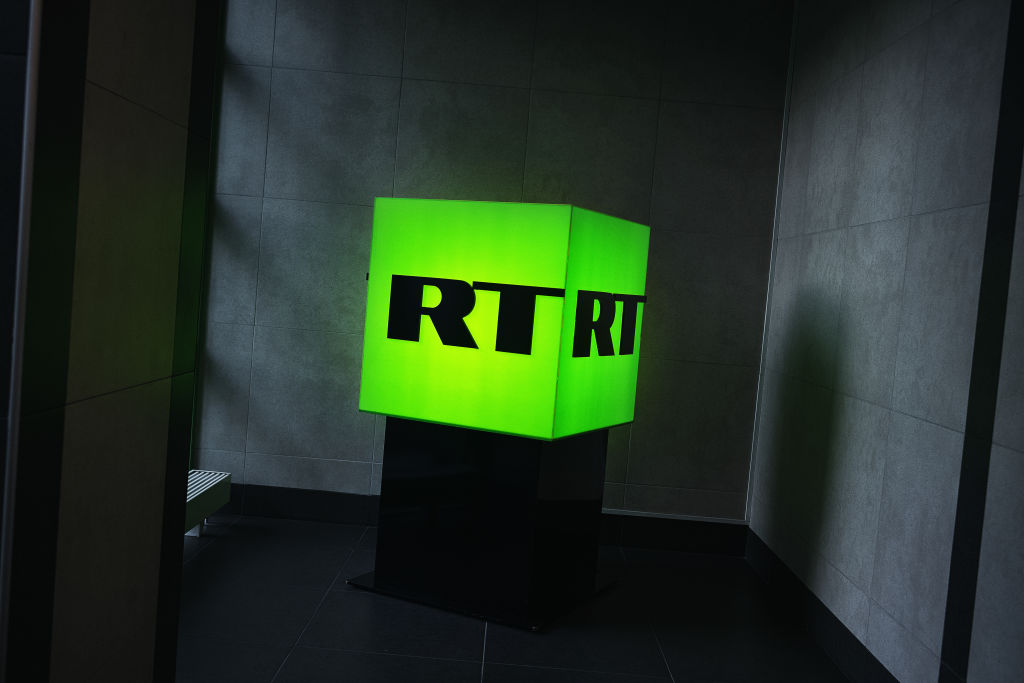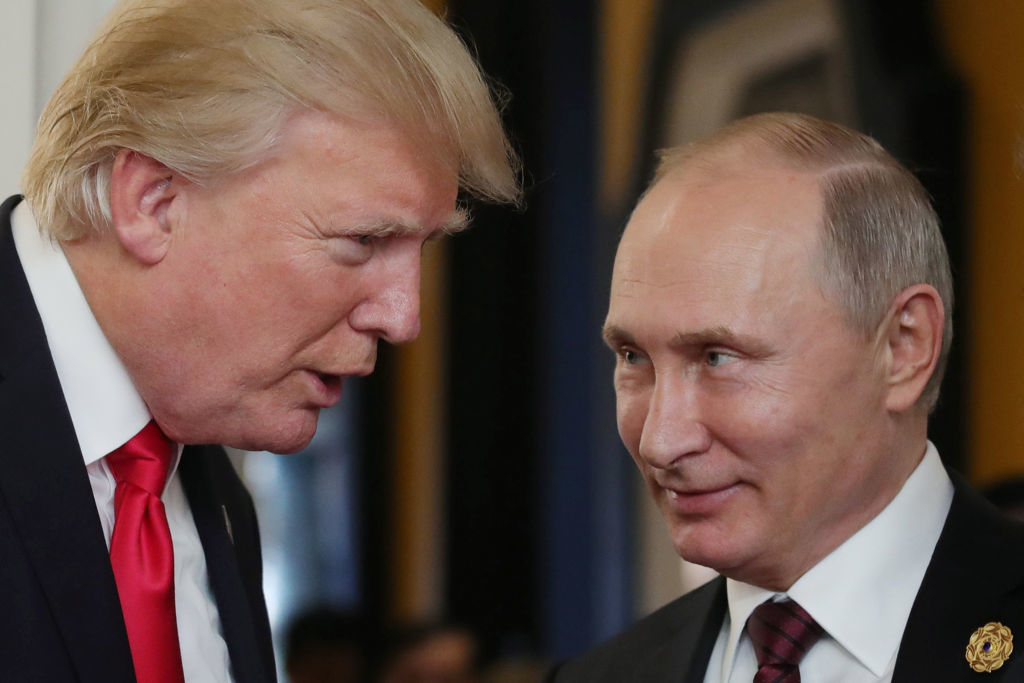During the Cold War, the Soviets would place defectors from the West under house arrest as soon as they arrived in Russia. The assumption was that, as soon as they realized what a dump the USSR was, they would try to sneak back home. And they were probably right. Still, it’s a credit to the Soviet propaganda machine that they showed up in the first place.
Back then, Russia did a great job of marketing itself. They paid top dollar to seduce high-ranking scientists and intelligence officials, while young radicals lined up to do the Kremlin’s bidding. Their disinformation was second to none.
And today? Well, put it this way. Last week, Russian foreign minister Sergei Lavrov said that Ukraine’s Jewish president, Volodymyr Zelenskyy, is a Nazi. “Wise Jewish people say that the most ardent antisemites are usually Jews,” Lavrov explained. Vladimir Putin then had to take a break from his invasion of Ukraine to call Israeli prime minister Naftali Bennett and apologize for his minister’s insensitive remarks.
This is one aspect of the Putin regime that isn’t talked about nearly enough: its unbelievably bad propaganda machine. For a major world power, Russia is uniquely bad at managing its self-image.
For instance, the Kremlin is extremely invested in the idea that Ukraine is teeming with neo-Nazis. It’s not just Lavrov. Putin also used his Victory Day speech to draw parallels between the Soviets’ war against the Third Reich and his own “special military operation.” And if you read Russian state media, you’ll hear all about the Azov Battalion, a 900-man division of the Ukrainian national guard that’s allegedly poised to take over the whole country.
If it sounds absurd, that’s because it is.
What’s funny is that even Russia’s allies don’t bother toeing that line. As soon as Russian tanks crossed the border, countries like Cuba, North Korea, and Iran blamed the United States for provoking Moscow. None of them mentioned Azov.
And yet, if you check out the Kremlin’s shills in the West, all they can talk about is this “Zelenskyy is Hitler” meme. Are those the orders that came down from Moscow? Or are they just bad at their jobs?
Either way, they’re definitely bad at their jobs.
Take Graham Phillips, the British civil servant-turned-Kremlin flak. He’s currently touring Ukraine as an honored guest of the Russian army. Members of the British government have accused him of war crimes for “interviewing” (interrogating) an Anglo-Ukrainian prisoner of war. Mr. Phillips is a small, strange-looking, and unpleasant — just about the worst possible profile given that he calls himself “the most honest journalist in the world,” though even his mother can’t possibly believe that.
And what about Gonzalo Lira? The Dartmouth alum got his start as a minor celebrity in the manosphere, marketing himself as a pickup artist. He was already living in Ukraine when Russia invaded and gained a wider audience by offering pro-Russia commentary on his YouTube channel “Coach Red Pill.” A spokesman for the Russian foreign ministry recently referred to Mr. Lira as a “famous film director,” though everyone who isn’t on the Kremlin’s payroll would probably prefer “obscure, Very Online weirdo.”
Or take Scott Ritter, the former U.N. weapons inspector who became a fixture of the anti-war movement. Mr. Ritter’s career bottomed out in 2011, when he was caught exposing himself to a police officer posing as a fifteen-year-old girl online. Mr. Ritter had never been an A-lister, but after going to jail for trying to sext a child, his career was basically over. So, of course, that made him a prime recruit for Russia Today, the Kremlin’s mouthpiece in Western media. Mr. Ritter also uses his platform to parrot Kremlin talking points about Ukrainian Nazis.
My favorite, though, is Russell Bonner Bentley III, a.k.a. Comrade Texas. A former pot dealer from the Lone Star State, Mr. Bentley moved to Donetsk in 2014, and has been working to make the Donbas part of Russia ever since. A video of Comrade Texas (which is still surprisingly obscure) shows him standing in front of a line of Russian tanks dressed in a leather jacket and Mao cap.
“It’s Texas on the front line with the de-Nazifiers and liberators of Ukraine,” he announces, before promising, “These guys are going to save and liberate all the good people of Ukraine. And the bad people? Boom! Kick their ass.”
What real value could any of these people possibly have for the Russian government? In terms of exporting Putin’s ideology, they’re useless. Actually, they’re worse than useless. Almost all of Russia’s American shills, like Max Blumenthal, use “right-wing” as a swear word.
Speaking of Russia Today, you would think Putin’s mouthpiece in the West would be… well, Putinist. In fact, the opposite is true. Its journalists are your typical American thirty-somethings. They’re all skinny and soft and vaguely left-wing, like Blumenthal. RT has always aligned itself with trendy social-justice movements like Occupy Wall Street, Wikileaks, and Black Lives Matter.
The Kremlin’s logic here is pretty obvious. They want to sow divisions in American society by highlighting government corruption, economic inequality, and civil strife. But if CNN can’t do the job, what makes RT think they stand a chance?
Russia Today might have done its masters some good had they positioned themselves a little to the right of Fox News. A traditionalist, nationalist, masculinist network would have done well in this media market. Instead, the Kremlin put all its eggs in the I’m-progressive-but-I-hate-America-so-much-I-actually-love-Putin basket.
The only question is, why? Why has Putin showed no interest in spreading his ideology? Why has the Kremlin basically ignored its natural allies, like paleocons and Orthobros? Why is its propaganda machine in overdrive with this stupid, pointless story about Ukraine becoming the Fourth Reich?
The answer, I think, is that Putin really has no interest in making friends abroad. He’s a pure nationalist. Russian power is his ideology.
The Zelenskyy-as-Hitler meme is really only supposed to galvanize the Russian base. (If you want to get the Russkies ginned up, tell them they’re fighting Nazis.) They don’t care if foreigners believe it or not.
Freelance shills like Phillips, Lira, Ritter, and Blumenthal aren’t there to spread Russian disinformation in the West. They only exist to make it seem like “independent” Western journalists are corroborating the Russian government’s lies.
Actually, Moscow probably thinks that exporting Putinism would help the United States. That’s why they won’t even try. They have no interest in strengthening their geopolitical rivals. That would be contrary to everything Putin believes in. That’s also why outlets like RT lean left. The Kremlin thinks progressive politics will hurt America.
What’s amazing is that Moscow really seems to believe that its methods will work. They believe future historians will talk about Putin’s ingenious campaign to bring down the American government from within via clever investments in digital media. Personally, I don’t see it working out. But what do I know? I get my news from The Spectator.
Michael Warren Davis is author of The Reactionary Mind. Subscribe to his newsletter “The Common Man” on Substack.

























